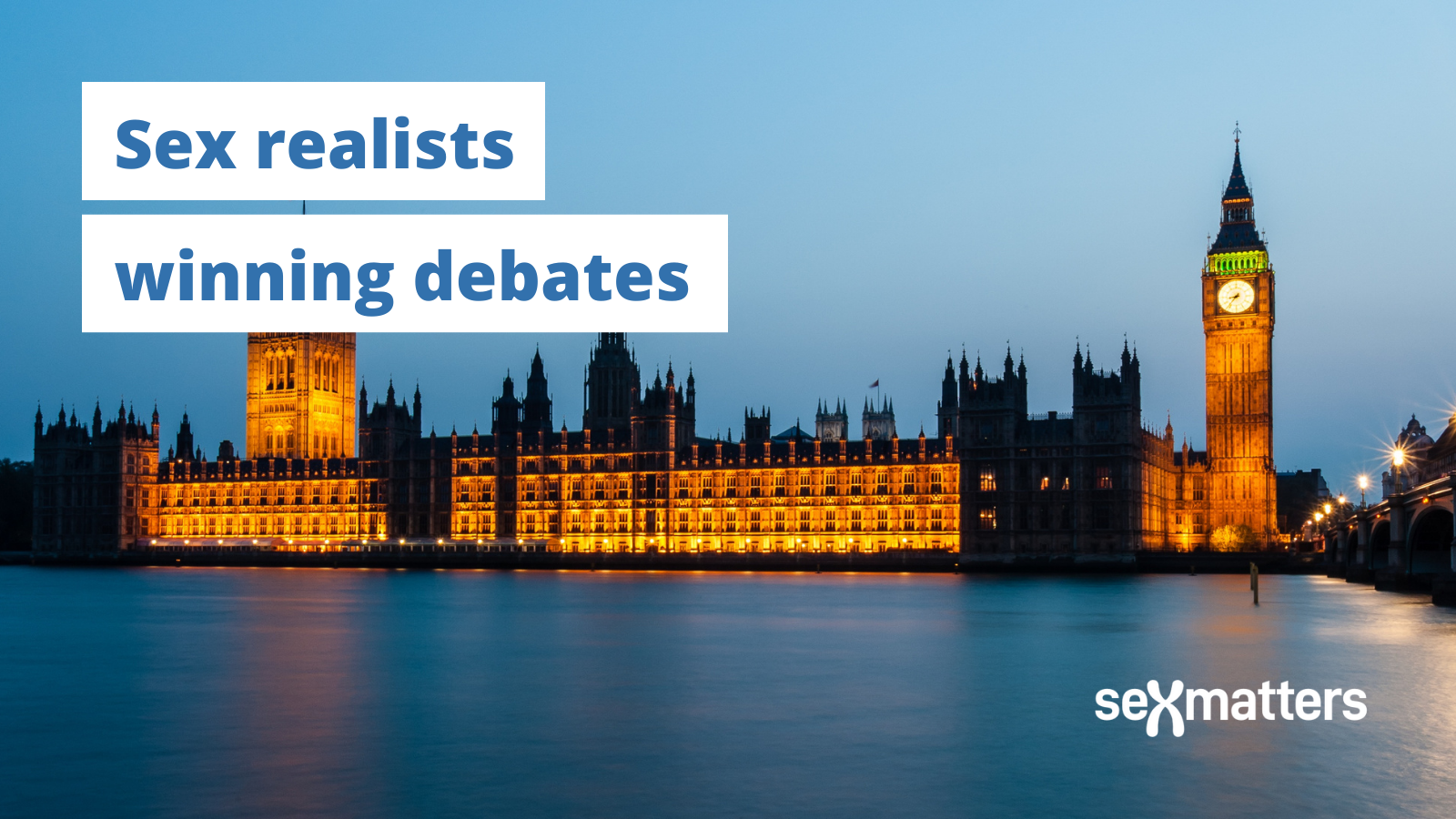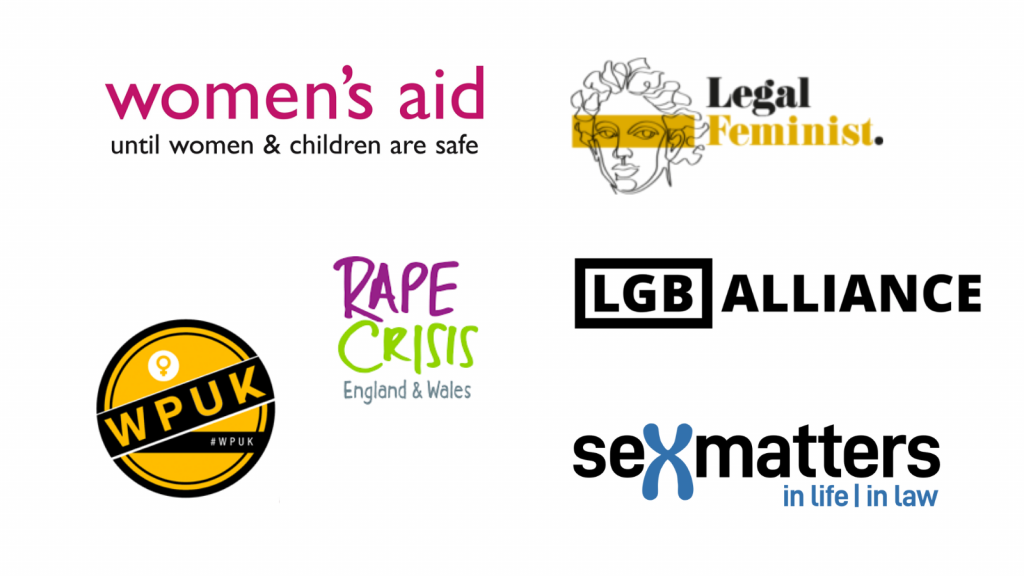Sex realists gaining ground at Westminster

Debates on new laws in Parliament are one of the key battlefields between sex realists and sex denialists, with one side seeking clarity on sex, and the other seeking to conflate and confuse sex and gender identity. A long-term strategy of the sex-denial lobbyists has been to propose legislation seemingly on one popular topic but whose aim is to introduce concepts such as gender identity or terms such as “pregnant person” onto the statute book and associated guidelines and policies.
Sex Matters, alongside other organisations, has been writing policy papers and submissions, and briefing MPs and peers. While these battles can be long and slow, we are all gaining some ground at Westminster, although progress is harder in Holyrood and the Senedd.
“Make misogyny a hate crime” campaign faces resistance
The Police, Crime, Sentencing and Courts Act 2022 achieved royal assent on 28th April 2022 and the Domestic Abuse Act the day after. Both Acts had seen off amendments to make “misogyny” a hate crime.
The proposal to make misogyny a hate crime was championed by Labour MP Stella Creasy with a coalition of organisations led by Stonewall, including the Fawcett Society, Hope Not Hate and Refuge and the support of Labour peer Helena Kennedy. These groups sought to define misogyny in terms of “sex or gender” and argued that the term “women” should include trans-identifying males. A well-funded campaign over several years of letter-writing, celebrity endorsement and events persuaded the opposition front bench and many politicians from other parties to support the seemingly attractive demand to outlaw misogyny and make it an aggravating factor in sentencing.
Organisations including the Women’s Aid Federation of England, Rape Crisis England and Wales, Sex Matters, Woman’s Place UK, Legal Feminist, and LGB Alliance have argued against the proposal.

Sex Matters’ advisory group member Joan Smith is among the many experienced feminist campaigners who said that police and prosecutors should focus on tackling violence against women, rather than policing perceptions of hostility.
She, like us, was concerned that a law which includes males who identify as women would be used against women speaking up in support of single-sex services. Noting that a male person is male and is therefore not welcome in women’s spaces could be argued to be “hostility based on sex and gender”.
The closest that misogyny as a hate crime came to becoming law at Westminster was the Conservative peer Baroness Newlove’s amendment, which was agreed by the House of Lords but rejected by the Commons. Instead, it was agreed that the Secretary of State must, within a year, prepare and publish a response to the Law Commission’s report on hate crime and lay it before Parliament.
The Law Commission report
The Law Commission’s report includes arguments on both sides. Arguments for misogyny to be made a hate crime tend to be vague and symbolic. The Fawcett Society felt that recognising crimes motivated by misogyny “would contribute to a cultural shift in our society”.
Arguments against tend to highlight the extent of impunity that currently exists for perpetrators of violence against women, and to call for police to direct resources towards enforcing existing law.
Rape Crisis England & Wales argued that the criminal justice system is already overburdened and risks being “further stretched” by the addition of sex/gender hate crime. It was also concerned that a focus on hostility to women would create “two tiers” of sex crimes and feed into rape myths focused on stranger perpetrators. Legal Feminist was particularly concerned about the freedom to engage in debate about sex and gender and that this law would result in “misgendering” and “deadnaming” being effectively criminalised.
The Law Commission consultation asked whether the law should protect women, or both men and women. Women’s Aid expressed serious concern that a law which did not focus on hostility specifically against women would do more harm than good, as it would draw attention away from understanding the “hostility that women receive [which is] deeply rooted in the societal inequality between women and men”.
Transactivist organisations such as GIRES, Trans Actual and Mermaids argued that protection should target “people of all genders, non-binary and otherwise gender diverse people”. Stonewall called for the use of the term “sex or gender” in order “to capture all women”. Stella Creasy MP argued that “sex or gender” would also ensure that “transmisogyny” is captured (although hostility towards transgender people is covered by existing hate-crime laws).
Sex Matters argued that conflating sex and gender identity in hate-crime laws would be a form of self-ID by the back door. The law commission responded that hate-crime law would not affect the provisions that apply in relation to the Gender Recognition Act 2004.
This is an overly narrow conception of how self-ID is being implemented. A new report from Policy Exchange, written by law professor Maureen O’Hara, highlights how policies and practices within the criminal justice system in England and Wales already classify and treat suspects, defendants in criminal trials and convicted offenders on the basis of their ‘gender identity’ rather than their biological sex, going beyond the Gender Recognition Act. This has taken place across police, CPS, courts and prisons
“without a foundation in law, and in the absence of democratic scrutiny or any established political consensus”.
Clear language in the law
One of the ways this policy capture has been allowed is by ambiguous wording in existing laws, or simply by misinterpretation.
The debate about clear and specific language in laws came to a head during the passage of the Ministerial and Other Maternity Allowances (MOMA) Bill in 2021. Sex Matters and others raised concerns about the replacement of “mother” and “woman” with “person”. This was taken up by sex-realist MPs and peers, notably Labour Peer Philip Hunt, who took the chance to debate the issues of sex and gender in the law. Ultimately, the bill was amended to include “mother” and “expectant mother”. Ministers committed to consider and review the Government’s approach to drafting legislation.
Last week Mark Spencer MP and Lord True presented the outcomes of this review to the Commons and the Lords. They called for a “common sense and practical approach” which recognises that biological sex is real, immutable and sometimes important, but which also ensures dignity, tolerance and respect for everyone.
The Ministerial statement made clear that:
“It can be appropriate to use sex-specific language in legislation where such language delivers the desired policy outcome. This may include, for example, legislation which relates to the needs of men and women respectively, or areas of policy where biological sex is a relevant or pertinent concept.”
It referenced the School Premises (England) Regulations 2012 as an example, in requiring separate toilet facilities in schools for boys and for girls.
It said that legal drafting must take account of the ability of people to change their legal sex by obtaining a Gender Recognition Certificate, but that drafters should consider the desired result for the particular legislation when choosing wording. For example, they could:
- use sex-specific language for the main case (for example “women”) with the addition of further wording so that the provision also has the desired policy outcome for less common cases (i.e. people who are legally male but biologically female)
- specifically disapply section 9 of the GRA
- use “woman or man”
- use an ungendered noun such as “patient”.
The Office of the Parliamentary Counsel will now update its drafting guidance. Sex Matters will be writing to it.
Writing to your MP makes a difference. The latest front in the battle in Westminster between sex realism and sex denial is the campaign to ban so-called “conversion therapy”. Write to your MP today.

